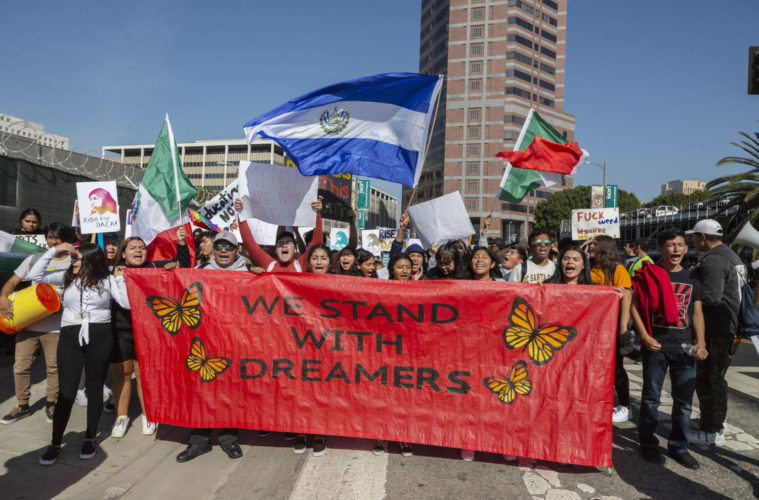The Supreme Court ruled that the Deferred Action for Childhood Arrivals (DACA) program is lawful in a case between the Department of Homeland Security and the regents of the University of California.
The ruling was 5-4, with Chief Justice John Roberts and justices Ruth Bader Ginsburg, Elena Kagan, Stephen Breyer and Sonia Sotomayor voting in favor, while justices Clarence Thomas, Samuel Alito, Neil Gorsuch and Brett Kavanaugh dissented.
“We do not decide whether DACA or its rescission are sound policies. ‘The wisdom’ of those decisions is none of our concern,” Chief Justice John Roberts wrote in the opinion for the majority. “We address only whether the agency complied with the procedural requirement that it provide a reasoned explanation for its action. Here the agency failed to consider the conspicuous issues of whether to retain forbearance and what if anything to do about the hardship to DACA recipients.”
FOLLOWING #SCOTUS DECISION TO UPHOLD #DACA, @CHIRLA FILES FIRST NEW DACA APPLICATION SINCE 2017
With this new application, we are signaling our bold, full intent to hold this President and the xenophobic ilk that run his government accountable.
Full:https://t.co/v5vktngLIw pic.twitter.com/UKvaMVQ6Wy
— CHIRLA (@CHIRLA) June 18, 2020
Immediately after the decision, L.A.’s Coalition for Humane Immigrant Rights (CHIRLA) announced they were filing their first new DACA application since 2017.
“The court’s decision to continue the original DACA program from 2012 breathes new life into relief that we have always known to be legal, just and fair,” said CHIRLA executive director Angelica Salas in a statement.
DACA’s History
DACA was an executive branch memorandum signed by former President Barack Obama in 2012. The program allowed over 600,000 undocumented immigrant children to apply for a two year “forbearance of removal,” but did not provide a direct path to U.S. citizenship.
After President Trump’s administration rescinded the Deferred Action for Parents of Americans and Lawful Permanent Residents (DAPA) Memorandum in 2017, the attorney general suggested that DACA had legal flaws and should be rescinded as well.
With that suggestion, the Department of Homeland Security argued that the DACA policy was “likely unlawful and should be enjoined.”
Court Decision May Not Be the End
This is the second White House-led immigration initiative to be blocked by the Supreme Court this week, as the president’s challenge of California’s “sanctuary” laws was rejected Monday.
In response to the DACA ruling, President Trump tweeted, “As president of the United States, I am asking for a legal solution on DACA, not a political one, consistent with the rule of law. The Supreme Court is not willing to give us one, so now we have to start this process all over again.”
The president later added in a separate tweet, “”These horrible & politically charged decisions coming out of the Supreme Court are shotgun blasts into the face of people that are proud to call themselves Republicans or conservatives.”
Derrick Johnson, president and CEO of the NAACP, who was included in the case, responded to the Court’s ruling in a statement, saying, “For far too long, the voices of the undocumented DACA recipients from the African Diaspora were silenced. There is no democratic dream for anyone if we don’t allow our DREAMers to fully participate.”
Johnson continued, “Although today represents an exciting victory, we won a battle; the war wages on. Trump could rescind DACA again tomorrow if he wants. The fight truly ends when Congress passes a permanent solution that protects DREAMERS, and the NAACP will continue that fight along with its allies.”
To check out a slideshow from previous local DACA protests, click here.
Advertising disclosure: We may receive compensation for some of the links in our stories. Thank you for supporting LA Weekly and our advertisers.

